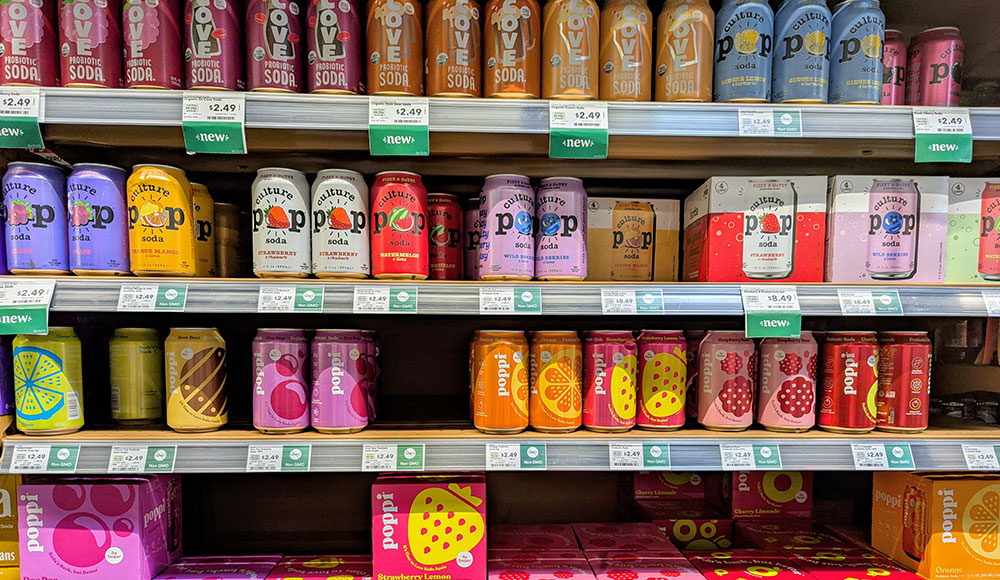Recently, I was browsing the aisles at Staff of Life when I overheard a mom ask her son, “Why are these Poppi drinks so popular?” The boy, maybe 12 years old, had no clue. But I did.
I managed to resist my inner Italian buttinsky—but I was dying to chime in: “Because they’re a low-sugar, prebiotic (aka healthy!) alternative to soda!”
Later the moment stuck with me. Are people really buying into these buzzy beverages for the health benefits of prebiotics? Or is it just about sipping something that tastes like soda but feels better for you? As a fan of flavorful carbonated drinks, I was curious: Are these trendy cans truly a smart way to support your gut?
What Are Prebiotics, Anyway?
Unlike probiotics—which are live beneficial bacteria—prebiotics are the fuel that feeds those good bugs in your gut. Our gut microbiomes need both versions to help with digestion, immune support and mood regulation. And prebiotics provide the nourishment to keep those bacteria thriving.
There are real benefits: prebiotics have been shown to improve digestion, regulate blood sugar, reduce constipation, and even boost calcium absorption to support bone health. There’s also promising research suggesting prebiotics can play a role in strengthening your immune system and improving mental health via the gut-brain connection.
But while prebiotic sodas can be helpful, they’re not a miracle cure. Drinks like Poppi, Olipop and SunSip often contain added sugar, which may counteract some of their gut health perks. And those health claims on the label? Terms like “no fake stuff” and “supports digestion” might sound compelling, but they haven’t been evaluated by the FDA. So while the packaging may be polished, it’s important to read between the lines.
What’s Actually Inside the Can?
Prebiotic sodas typically contain plant-derived fibers like kudzu root, Jerusalem artichoke, agave inulin, organic acacia fiber, or nopal cactus. These are all sources of inulin or other fermentable fibers that feed beneficial bacteria in the gut.
Depending on the brand, the amount of prebiotic fiber can vary widely:
- Olipop: ~9g of prebiotics per can
- Poppi & SunSip: ~2g per can
To put that into context, the general recommendation for daily prebiotic intake is about 5g. That means you’d need multiple cans of Poppi or SunSip to reach the threshold—and with that, more added sugars or artificial sweeteners.
While these drinks can be a tasty and refreshing way to supplement your diet, they shouldn’t be a replacement source of prebiotics. And for some people, especially those with sensitive digestion, they can even cause side effects like gas, bloating, cramping or diarrhea.
Not for Everyone
There’s still no medical consensus on whether prebiotic sodas are problematic for vulnerable populations. But most health experts agree: children, pregnant women, and people with digestive disorders or compromised immune systems should use caution.
In fact, for these groups, whole-food sources of prebiotics are a safer, more effective way to support gut health. You won’t find fancy branding or colorful packaging in a banana or stalk of asparagus, but you will find fiber and nutrients that work naturally with your body.
The Real Gut-Health Heroes
Highly processed foods and sugary beverages disrupt gut health—and prebiotic soda won’t fix that alone. But adopting a Mediterranean-style diet rich in fiber and plant-based foods can.
Prebiotics occur naturally in many everyday ingredients, especially fruits, vegetables, beans and whole grains. According to Harvard Public Health, top sources include the following:
- Garlic
- Onions
- Bananas
- Jerusalem artichokes
- Soybeans
- Asparagus
- Wheat and other whole grains
These are all staples of the Mediterranean diet, which emphasizes whole foods, good fats and plant-forward meals—a tried-and-true approach to long-term health.
One recent study even found that people who consumed 30 grams of inulin-rich foods daily for two weeks were more likely to choose moderate- or low-calorie foods over high-calorie options. Their MRIs showed reduced activity in the brain’s reward centers when shown high-calorie foods—suggesting that prebiotic foods may help influence healthier dietary choices.
So, Should You Sip It?
If you’re switching from sugary soft drinks to low-sugar prebiotic sodas like Poppi, that’s a step in the right direction. But don’t count on canned fiber alone to keep your gut in balance.
What would I say to that mom at Staff of Life now, after doing a little more digging? If your kids like the flavor and you’re trying to replace soda with something less sugary, go for it! Just don’t forget to stock up on garlic, greens, grains and good old-fashioned produce while you’re at it. For the best gut health bang for your buck, eat like you’re in the Mediterranean.
Elizabeth Borelli is a published author and Mediterranean lifestyle expert. Visit elizabethborelli.com for resources, news and events.











